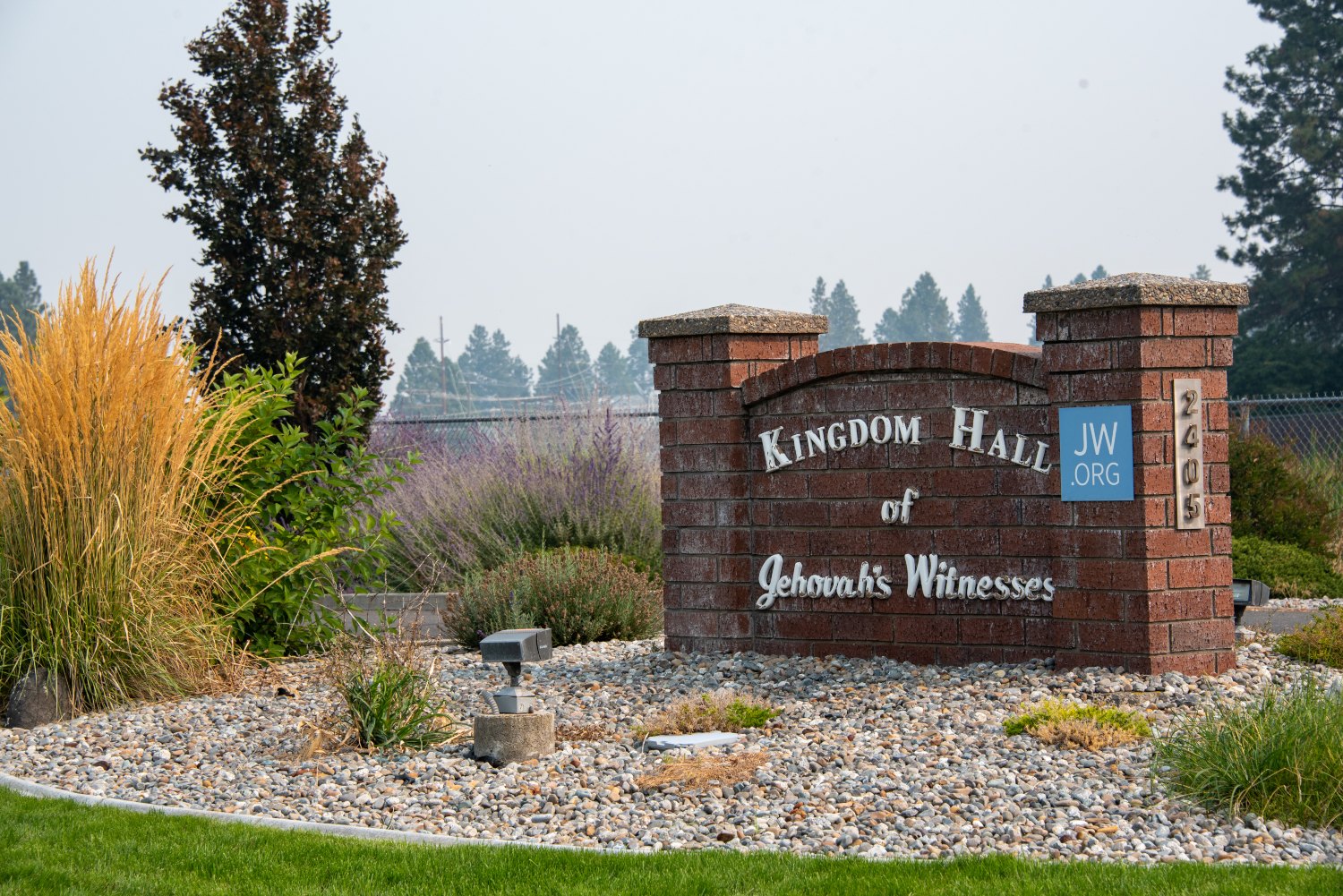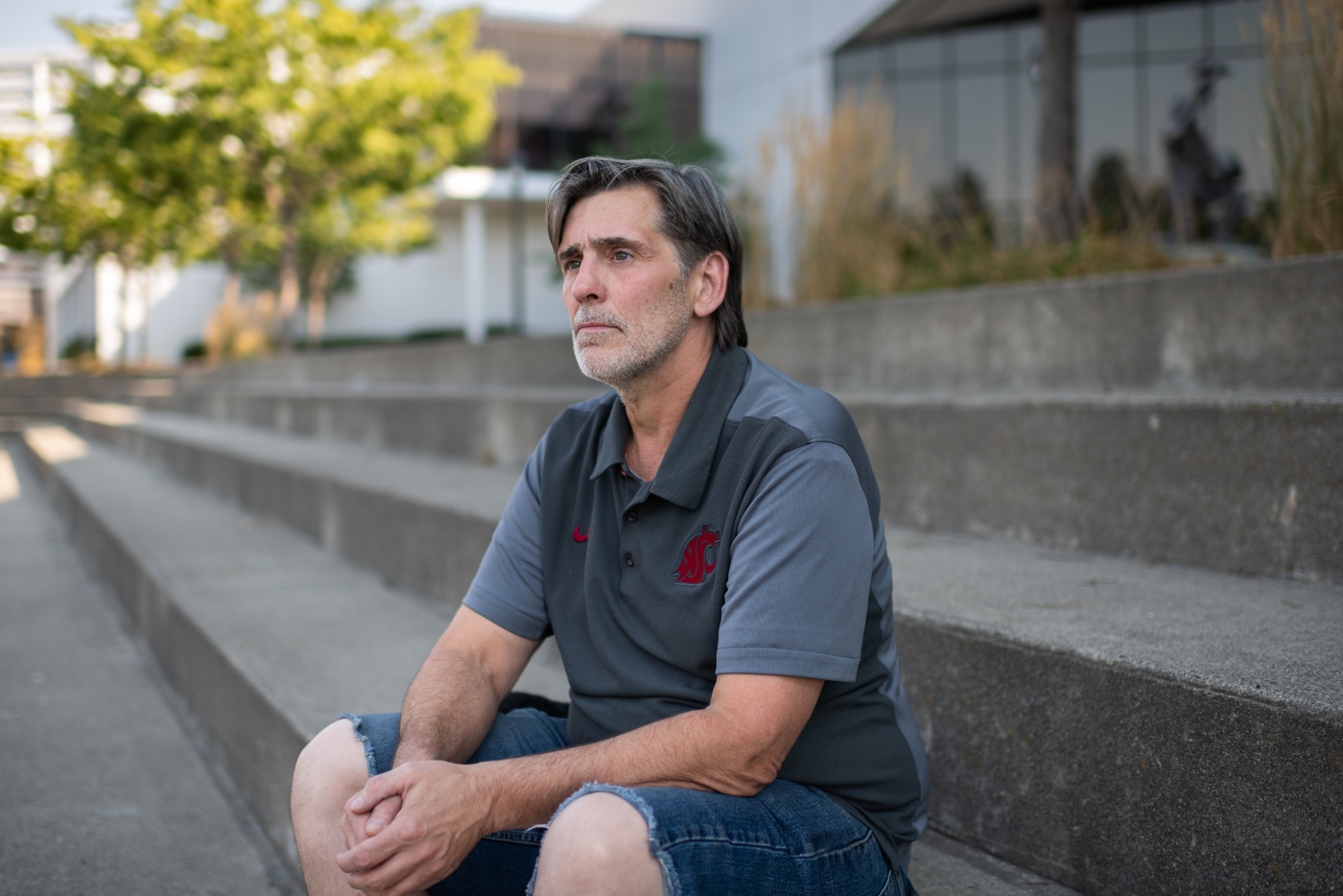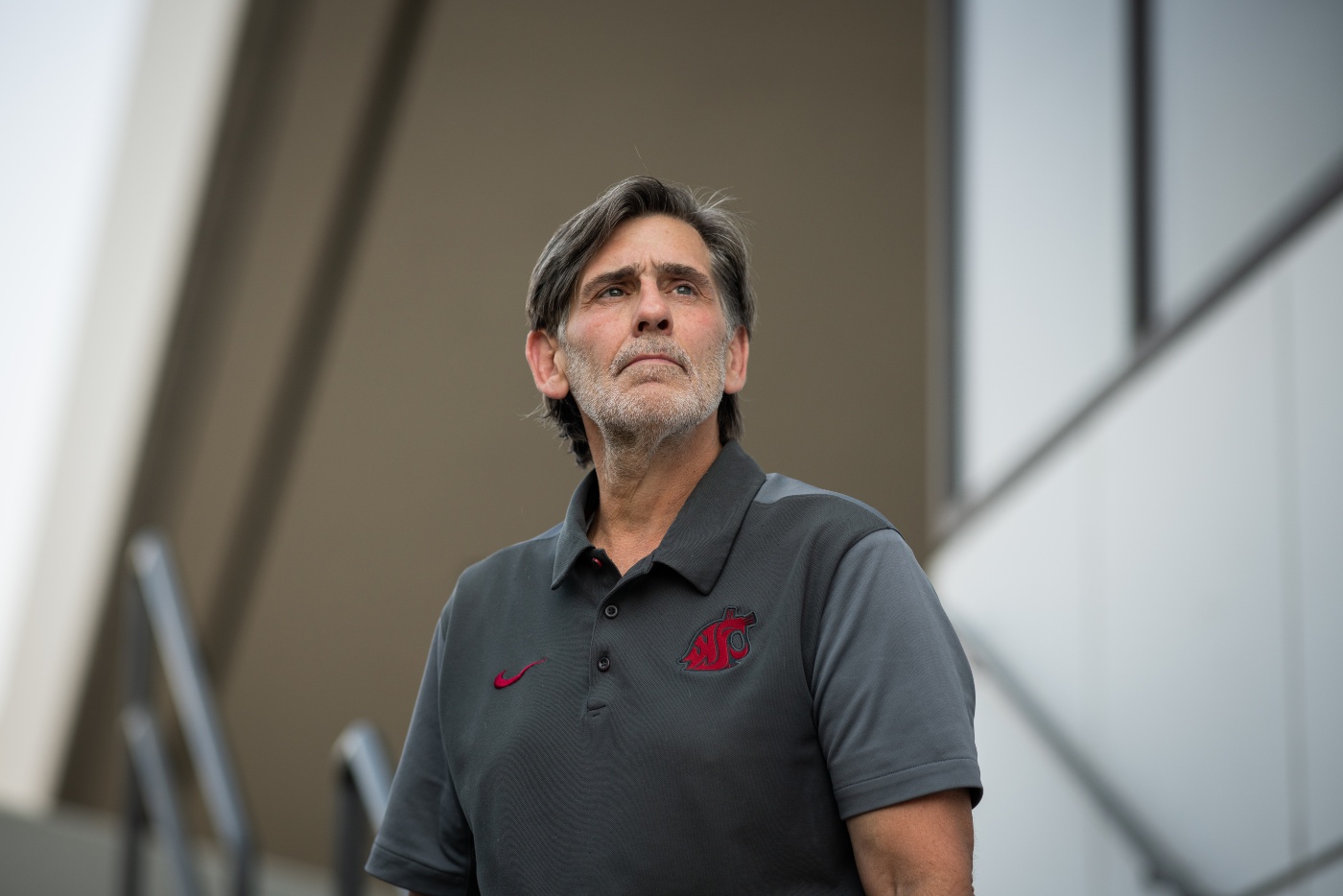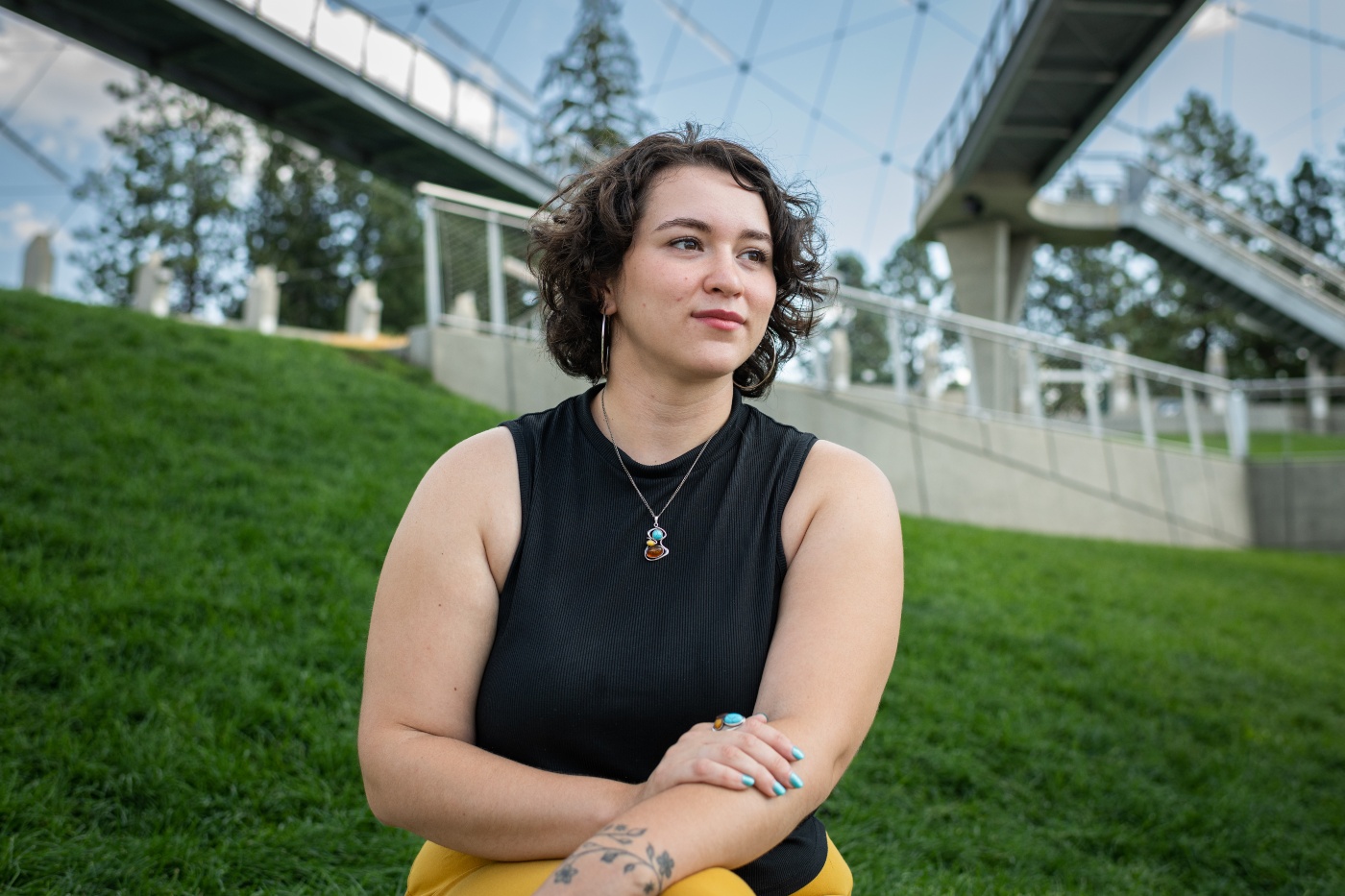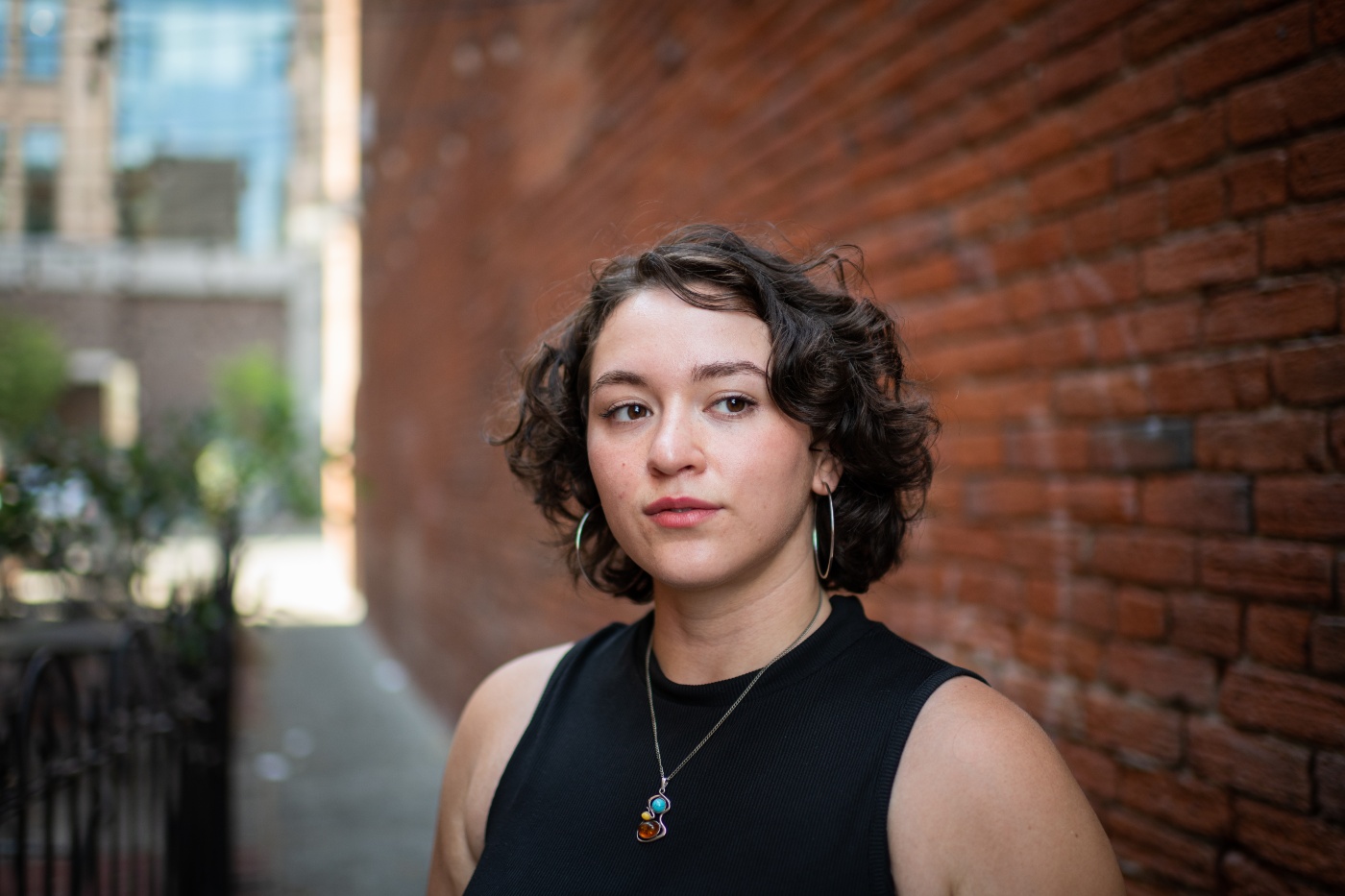By Wilson Criscione / InvestigateWest
They were in the Bible study room when Deryk Terril, a shy 11-year-old with shaggy hair in 1976, found the courage to finally say something: An elder at a Jehovah’s Witnesses congregation in Spokane, Wash., had been molesting him for years, Terril, now 57, recounts in a lawsuit filed in August.
He says he told a church leader he trusted to protect him.
Instead, the church leader got angry and told Terril they could do nothing about it without a second witness, Terril says. Police weren’t notified, he says, nor were his parents. The church allowed the alleged abuser, John Earl Jones, to continue spending time with Terril, and he molested the boy for years after, court documents say.
Around the same time, the mother of another boy in the congregation, Daniel Enholm, reported to the church that Jones had touched her son, too. Again, the other church leaders failed to act, allowing Jones to be around the boys, the lawsuit says.
In the years after that, more boys came forward saying Jones sexually abused them, according to Terril and Enholm. Still, they say, church officials never alerted police.
Jones abused at least two more children in the following decades, court records show, before spending 16 years in a California prison for continuous sexual abuse of a child under 14. “It could have been prevented if somebody had called the police [back in the ’70s],” Enholm tells InvestigateWest.
Jones, now 72, has since been released from prison. InvestigateWest’s attempts to reach him for this story were unsuccessful.
InvestigateWest typically doesn’t identify alleged victims of sexual assault, but several victims decided to speak out publicly for this article in the hopes of holding the church accountable for its history of silence.
The allegations against Jones and the Jehovah’s Witnesses congregation in Spokane are detailed in a lawsuit filed in August by Terril and Enholm, who are represented by Steven Reich, an attorney with Seattle-based Pfau Cochran Vertetis Amala Attorneys at Law.
Theirs joins a growing mountain of cases against Jehovah’s Witnesses alleging the church conceals sexual abuse. Those lawsuits have revealed that the Watchtower Bible and Tract Society — the nonprofit that oversees the Jehovah’s Witnesses from New York — maintains a secret database containing allegations of child molestation across multiple decades, and most allegations have not been shared with law enforcement. The Watchtower has refused to release the contents of the database.
Watchtower spokespeople did not answer questions when reached by InvestigateWest, but instead shared materials about its position on child sexual abuse, which it calls a “worldwide plague.” Individual Jehovah’s Witnesses congregations did not respond to messages seeking comment.
The church, according to internal documents, believes elders should keep abuse allegations confidential unless law explicitly compels them to report it. And Washington’s mandatory reporter law, one of the weakest in the country when it comes to clergy, makes it easier for these allegations to stay hidden.
Washington lawmakers removed clergy members from its mandatory reporter list in 1975. It’s one of seven states where clergy are not mandatory reporters of child abuse, and of those seven states, it’s one of only two — Alaska being the other — that also specify that communications between church members and clergy are protected from disclosure to authorities, according to a federal agency that tracks state laws.
Mark O’Donnell, a former Jehovah’s Witness who now acts as a consultant in sexual-abuse cases against Jehovah’s Witnesses, says states where clergy are not mandated reporters leave children particularly vulnerable to the church concealing their abuse.
“Unfortunately, Jehovah’s Witness elders are not permitted to directly notify law enforcement, but are required to route allegations through their New York headquarters,” O’Donnell says. “This effectively handcuffs local elders and hinders the police from protecting the public, including non-Jehovah’s Witness children at risk from Witness predators.”
IGNORED WARNINGS
The first time it happened was on a camping trip, in a pristine forest near Priest Lake, Idaho, in 1973, Terril recalls.
During the trip, Terril, then 8 years old, woke up one morning in his tent with Jones touching him, Terril says in an interview with InvestigateWest. When Terril ran from the tent, Jones convinced Terril he’d just been dreaming.
Jones continued to spend time with Terril, often through church duties. They’d end up at Jones’ house, where he says the sexual assault continued.
Often, Jones would first show Terril a gun, Terril says.
“He put it under the pillow and then he would raise the blanket and invite you in his bed,” Terril remembers. “I didn’t know if he was going to kill me.”
When he told another elder what Jones had been doing to him that day in the Bible study room, Terril immediately regretted saying anything. The man, whose name Terril cannot recall, told Terril that according to scripture, at least two witnesses were needed to accuse somebody of molestation — a longstanding rule among Jehovah’s Witnesses that exists to this day. The religion bases this rule on a passage in the Bible, Deuteronomy 19:15: “No single witness can convict another for any error or any sin that he may commit. On the testimony of two witnesses, or on the testimony of three witnesses, the matter should be established.”
“And at that point, I shut down,” he says.
The Spokane Police Department tells InvestigateWest that it has no record of any report alleging child molestation against Jones in the 1970s, though the department warns that it may not keep records of sex crimes if 15 years have passed.
Jones, meanwhile, kept his access to children in the congregation, the lawsuit says.
By around 1979, Terril had suffered six years of sexual abuse. He had a “breakdown,” as he describes it, and told his mother everything. She told the elders, who arranged a meeting with Terril, then 14, at Kingdom Hall, what Witnesses refer to as their place of worship. They sat in front of him, grilling him on what happened for half an hour, as Terril remembers.
“Even then I wasn’t allowed to tell my story. I was just basically quizzed. … They turned me into the perpetrator and treated me like I was guilty of something,” Terril says.
The elders, however, already had been told that Jones abused at least one other child. Daniel Enholm was 11 years old in 1975 when he says Jones molested him, according to the lawsuit filed in court. Enholm eventually told his mom what happened two years later. She told the other elders at the congregation, according to Enholm.
Terril and Enhold say Jones was finally “disfellowshipped” from the church in the late 1970s, meaning he was shunned by its members — a common punishment handed out by the church. But by the early 1980s, Jones was reinstated in another congregation.
In 1984, Jones pleaded guilty to molesting a young boy on another camping trip in Idaho. But he was only given probation, in part because the Kootenai County judge — with no other accusations made public — said there is “no pattern of long-term abuse,” according to a news account at the time.
In 1993, having received no prison time for the Kootenai County molestation, Jones moved to Placerville, California. A 12-year-old boy lived a few doors down. For the next several years, Jones continually sexually assaulted the boy.
During that trial, a relative of Jones testified that the abuse was similar to what Jones had done to him personally when the relative was the ages of 12-14, court documents say.
In 2007, Jones was sentenced to 16 years in prison.
Terril says the abuse he suffered as a child put him in a dark place for most of his life.
“I’m hoping to hold the Jehovah’s Witnesses accountable for what they’ve done,” he tells InvestigateWest. “And hopefully, this will bring other people forward, and they can find healing in this.”
LINE OF SECRECY
Jehovah’s Witnesses originated in the late 1800s from a small group of people studying the Bible in Pennsylvania. Witnesses believe that Jehovah is God’s personal name, that he will bring an armageddon that will destroy all who don’t follow their faith, and that this armageddon is near.
Today, the church says it has nearly 8.7 million members around the world in roughly 120,000 congregations. In the U.S., state-level population comparisons of Jehovah’s Witnesses are difficult to find, but according to the Pew Research Center, Washington’s percentage of Jehovah’s Witnesses ranks in the top five of all states.
Jehovah’s Witnesses say they “abhor child abuse.” A document on the church’s website, called “Jehovah’s Witnesses’ Scripturally Based Position on Child Protection,” states that Witnesses “view it as a crime,” adding that elders “do not shield any perpetrator of child abuse from the authorities.”
But this doesn’t square with the way child abuse allegations have been handled in practice, according to a slew of lawsuits and accounts from former Jehovah’s Witnesses. In Jehovah’s Witnesses congregations worldwide, child abuse allegations remain hidden due both to the religion’s beliefs and a hierarchical structure that demands secrecy.
If there are two witnesses, or if the abuser makes an admission to elders, a congregational body of elders forms a “judicial committee” to investigate the allegations. But this committee must remain strictly confidential, according to the manuals issued to each elder and obtained by InvestigateWest.
Elders typically receive no formal training in how to interview survivors or investigate sexual assault, according to current and former church leaders. They are not instructed to call authorities. Instead, they are instructed to call the Watchtower headquarters in New York. According to an article on the Jehovah’s Witnesses website, this is so that elders can “seek direction on how they can comply” with “secular laws” about reporting the abuse. It’s also during this call that the Watchtower asks a series of questions about the perpetrator, which forms the basis of its secret database of accused child molesters.
The elder’s manual, updated in April 2022, acknowledges that some elders “may be obligated by law to report the allegation to secular authorities.” But the manual does not encourage elders to do so unless required.
That makes each state’s mandatory reporter law important. In a majority of states, clergy are mandated to report child abuse, and in 18 states any person suspecting child abuse must report it. But many of those states have laws that contain “clergy-penitent privilege,” exempting religious religious leaders from reporting suspected abuse or neglect, according to a federal agency tracking the state laws. In Washington, clergy are not mandated reporters and also have clergy-penitent privilege — though clergy can elect to report and are provided statutory immunity from liability.
All of this serves to deflect personal accountability from elders, says O’Donnell, the former longtime Jehovah’s Witness who left the church about 10 years ago.
“The elders have no thought in their mind that they’re going to get in trouble for not reporting,” O’Donnell said. “They’re not allowed to go beyond what Watchtower tells them. It would be insubordinate if they break protocols.”
It’s extremely rare for elders to be held accountable if they do fail to report sexual abuse, even if they live in a state where they are mandatory reporters. But it is possible. Earlier this year, two elders in Illinois were convicted of failing to report a child being sexually assaulted in 2006.
CULTURE OF SILENCE
In 1997, Moriah Hughes was born in Kalispell, Montana, to a family of Witnesses.
Growing up in the church, there were things about the religion that Hughes liked as a young girl — like how they would live in a paradise one day. In this paradise, brought on by God’s destruction of all worldly and wicked people, there would be no sickness or death. As long as you were a Witness, you were safe.
There were also things that bothered Hughes. One story that stuck out to her was the story “Lot’s wife looked back.” In it, Lot’s unnamed wife is told by angels to flee her home without looking back. When she does look back momentarily, she’s turned into a pillar of salt. The lesson: Those who disobey God will die.
But Hughes, a child of divorce who bounced from Montana to Washington, sympathized with Lot’s wife. Isn’t it natural to take one last glance back at your home?
“And I felt immediate shame,” Hughes recalls. “It really instilled in me that even simple, natural desires have very serious outcomes.”
When she was 14, Hughes met a man in his 20s named Elihu Rodriguez at the South Spanish Congregation in Milton, Washington, just east of Tacoma. Rodriguez, according to a lawsuit filed in 2021, had moved to the Milton congregation after sexually abusing four girls at a prior congregation, which prompted a letter alerting the Milton elders of the previous abuse. It was otherwise kept quiet, and Hughes saw no reason to distrust Rodriguez. After all, it was outsiders who posed a threat, she was taught — not fellow Witnesses.
He started grooming her, Hughes says, in July 2012 — leaving her secret notes, showing up at her house in the middle of the night. It progressed into molestation and rape that occurred repeatedly until Hughes was 16, when a family member caught Hughes and Rodriguez together. Hughes then moved across the mountains to live with her mom just outside Spokane.
Hughes told her mom what happened in late 2013, and it prompted a meeting of elders at the Fairfield Congregation, south of Spokane. The meeting wasn’t meant to put Rodriguez on trial. Rather, it was because Hughes had allegedly sinned by having sex before marriage. Even Hughes believed it was her fault, in part because she hadn’t run away or screamed. Screaming, Witnesses teach, means that a woman did all she could to resist the rape. Otherwise, the woman is guilty.
The meeting with Hughes affirmed this.
“It was very much that I was a willing participant who had consented to these acts. I was not a victim of abuse at all in their eyes,” Hughes says. “They said things like I wasn’t sorry enough to God for what I had done, especially having done it multiple times.”
It wasn’t until years later that Hughes would question all this. One thought in particular kept coming back to her: Why didn’t anyone protect me? Eventually, she called police in Federal Way, Washington, and reported the crime. It turned out someone else had made a criminal complaint against Rodriguez a few years earlier.
With two accusers, Rodriguez pleaded guilty to felony child rape in 2019 and was ordered to serve five years in prison. Today, Hughes is suing Jehovah’s Witnesses for failing to protect her from Rodriguez. It took years, but Hughes finally feels like she’s closer to letting go of her trauma. She’s built a new family and community that supports her. She works with a group that helps survivors of childhood sexual trauma, and she’s writing a memoir about her experience.
But for Hughes, justice came at a personal cost. As the criminal case against Rodriguez developed, Hughes’ relationship with her family was shattered. Shunning anyone who has been disfellowshipped or leaves the church — even family members — is common for Jehovah’s Witnesses. That alone is a major reason sexual assault victims don’t speak out, Hughes says.
“They’re so blinded by the culture and the organization and the way of life that they don’t even see that what they did was wrong,” Hughes says. “It’s the culture and organizational control that allows things like this to happen.”
DEEPER ISSUE
These stories aren’t unique. Dozens of lawsuits have been filed since 2010 alleging elders hid or mishandled allegations of child abuse. In Washington, two lawsuits show the same pattern: A woman sued the church in 2013 in Hazel Dell, north of Vancouver, for not taking action. In 2004, a woman filed a lawsuit when the Opportunity Congregation in Spokane reinstated her molester only six months after disfellowshipping him for the abuse.
InvestigateWest has uncovered several more cases of alleged sexual abuse by Jehovah’s Witnesses. Those include two criminal cases: Bruce Alan Deines, 73, of Seattle is currently in a state prison for repeatedly raping a girl from the age of 5 or 6 until she was 10 years old, court records show. And Rin Kang, 44, in Deer Park was charged with second-degree assault of a child before pleading to a lesser charge.
Former Witnesses say sexual abusers are still in positions of authority to this day. Lindsay Phillips, 35, says she was molested by her older brother Travis Phillips, 48, while they were growing up until she turned 5 years old. It was never brought to police, only handled within the congregation, Lindsay says.
“It was brushed under the table,” she says.
Travis Phillips is currently an elder at the Mead Congregation, north of Spokane, despite Lindsay attempting to notify other elders of the allegations he abused her and another family member. In 2012, an email thread provided by Lindsay shows her confronting Travis with specific allegations of molestation. After initially declining to talk to Lindsay because she was disfellowshipped, Travis denies the examples Lindsay offered, yet admitted “the only thing that happened was a bit of exploration.”
Reached by phone, Travis Phillips told InvestigateWest that he admits to making mistakes growing up. He says he did have an “inappropriate relationship” with another younger family member that involved “exploring sexuality.” With Lindsay, he says, he “didn’t touch” her but only “took a peek” to see what a girl looks like instead of a boy. Lindsay, however, remembers far more disturbing instances of him molesting her.
Phillips maintains that this all occurred when he was a kid and not a Jehovah’s Witness. He’s never been charged.
Believing the statute of limitations had passed, Lindsay never reported her allegations to police, but says she’s concerned that he’s an authority figure in the church tasked with handling similar situations.
“He has a position of power, where people will blindly trust him,” she says.
When asked if his past calls into question his ability to respond to sexual abuse by members of his own congregation, Phillips defers to Jehovah’s Witnesses policies. In his view, these policies prevent allegations from being hidden. The “two witness” rule is necessary to make sure people aren’t falsely accused, he argues.
“There’s no cover-up possible anymore, anywhere, ever,” Phillips says. “Our job is to protect people, and it’s kind of sad that people get mad at the church for something that an individual does.”
The church does not discourage anyone from contacting authorities, he says. Still, Phillips admits that “we absolutely do not do it ourselves” unless compelled by the law.
“The people who need to know, do know,” Phillips says, referring to other parents in the congregation. “But we don’t broadcast to the congregation.”
HOLDING THEM ACCOUNTABLE
In the last decade, government commissions in the United Kingdom and Australia have investigated Jehovah’s Witnesses child abuse policies. Australia’s Royal Commission into Institutional Responses to Child Sexual Abuse uncovered more than 1,000 allegations of child sexual abuse since 1950, with the offender admitting to the abuse more than half the time. Of all those cases, not one was reported to the authorities.
“As long as the Jehovah’s Witness organisation continues to apply these practices in its response to allegations of child sexual abuse, it will remain an organisation that does not respond adequately to child sexual abuse and that fails to protect children,” the Australian commission wrote.

A spokesperson for Washington Attorney General Bob Ferguson said they have a policy of not confirming or denying the existence of an investigation, noting that the AG’s office “cannot investigate or prosecute a criminal violation without receiving and accepting a referral from a county prosecutor or the Governor.”
In the United States, there’s been no formal government investigation. And while federal agencies and state attorneys general have launched a series of investigations into the Catholic Church for its history of sexual abuse, the only state to formally investigate whether Jehovah’s Witnesses repeatedly failed to report child sexual abuse is Pennsylvania.
InvestigateWest presented a summary of the findings of this article to the Washington State Attorney General’s Office headed by Bob Ferguson. A spokesperson for his office said they have a policy of not confirming or denying the existence of an investigation, noting that the AG’s office “cannot investigate or prosecute a criminal violation without receiving and accepting a referral from a county prosecutor or the Governor.”
Such an investigation might be a challenge in Washington due to the state’s mandatory reporter law that exempts clergy. A change to that law could help victims of abuse get justice, Hughes says. But just as important for Hughes is that elders receive some sort of training in talking to victims of sexual abuse or trauma.
“Obviously, the traumatic event itself is very serious. But it’s the response immediately after that makes or breaks a person and impacts their ability to heal and function afterward,” Hughes says.
FEATURED IMAGE: Kingdom Hall of Jehovah’s Witnesses on Spokane’s South Hill. (Wilson Criscione/InvestigateWest)
InvestigateWest (invw.org) is an independent news nonprofit dedicated to investigative journalism in the Pacific Northwest. Visit invw.org/newsletters to sign up for weekly updates.

